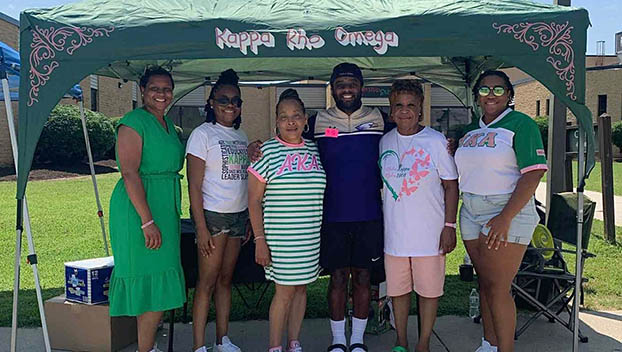State error causes problem for Lunenburg, other school districts
Published 4:21 pm Wednesday, February 1, 2023
|
Getting your Trinity Audio player ready...
|
VICTORIA – On Jan. 1, Virginia eliminated its grocery tax. There was just one problem. That tax had provided millions of dollars in funding for school districts across the state, including Lunenburg County. Specifically, $201 million had been set aside in the current two-year state budget, money that would go from the grocery tax to help fund schools. Districts budgeted with their share of that money in mind, expecting it to come because nobody told them otherwise.
That’s why superintendents were surprised last Friday, when they all received a letter from the Virginia Department of Education. It explained there had been an error and now, more than three fourths of the way through the current school year, districts won’t receive all the state funding that had been promised, for this year or the next.
It makes a difference, local superintendents say, because budgets are tight already.
Trending
“Any decrease in funding for any organization can have an impact,” said Dr. Chip Jones. He serves as superintendent for Cumberland County Public Schools. “[It matters] especially when you are trying to recruit and retain staff, maintain opportunities for students and staff and deal with the rising costs of goods and services.”
How much will Lunenburg, others lose?
According to Virginia Department of Education Director of Communications Charles Pyle, Lunenburg County Public Schools will lose $92,000 as a result of the error this year, with another $288,000 going away in fiscal year 2024. We are in fiscal year 2023, so that refers to the current school year.
The news isn’t much better for districts around here. Prince Edward County is expected to move $131,000 this school year, with another $325,000 lost when classes start back in the fall. Cumberland County, meanwhile, will lose $76,000 this year and $187,000 for next year in state funding.
The news isn’t great for Buckingham County either. Originally, the school district expected to lose $200,000 overall. Now Pyle says they’ll lose $116,000 this year and $287,000 in fiscal year 2024. Nearby Charlotte County stands to lose $106,000 this current fiscal year, and then another $263,000 next year.
How did this happen?
The biggest question is how did this happen? It comes down to two mistakes. First, from the end of Gov. Ralph Northam’s term to the beginning of Gov. Youngkin’s, there has been a push to get rid of the state’s grocery tax. That finally happened last year, removed as part of budget negotiations. Here’s where the problem comes in. Multiple members of the Assembly had said the schools would be “held harmless”, that is the state would find another source to give them the $201 million over two years it was taking away. That promise never ended up on paper, however. In the final budget signed in June 2022, there was no alternative source for that funding to come from.
And so, the state had $201 million less than before to give schools. But the Department of Education also made an accounting error. Each year, they give districts a budget tool, a mathematical formula that helps the district’s staff determine how much each district would receive from the state over the next two years. The department didn’t account for the loss of the $201 million, so their tool gave incorrect numbers.
Trending
The districts then used that incorrect information to set up their budgets, plan, pay for salaries and make repairs.
Virginia Department of Education Director of Communications Charles Pyle said it was just simple human error.
“We did not catch the error in the tool until last week,” Pyle said. “We notified staff of both House Appropriations and Senate Finance on Wednesday.”
That would be last Wednesday, Jan. 25, with school district superintendents receiving an email about the situation two days later.
A rock and a hard place
So now districts are aware that there will be a shortfall. However, the state can’t tell them exactly how much it will be yet. And it could be a few days, if not weeks, before that changes.
So how do you fix a problem like this? Virginia State Superintendent Jillian Balow has promised each district will receive an updated estimate later in February, once the Virginia House and Senate agree to budget revisions. But first, state lawmakers have to agree. Sometimes that’s a one-day agreed upon vote. In other years, it’s taken days to negotiate a deal in the Assembly. At the moment, the Department of Education is telling districts to expect updated numbers by Feb. 9.
And yes, Virginia currently has a state surplus of $3.6 billion, which could cover the $201 million shortfall. However, that would have to be negotiated in the Assembly. Also, that’s a one-time solution. Long-term, the loss of the grocery tax means the districts will have to either expect significantly less revenue from the state or the Assembly will have to find a permanent revenue stream to replace the one that was lost.
“We are currently looking for a way to make the school districts whole,” said Virginia State Sen. Frank Ruff.
The problem, Ruff said, is that state lawmakers are playing catchup. Despite the fact DOE officials said they notified the House and Senate, the actual full membership didn’t find out until the public did.
What happens for Lunenburg, other districts?
One additional problem is that Lunenburg and other districts are trying to work through their budgets for next year now. This change means all districts are stuck, until they see how much money, if any, the Assembly will give to cover the shortfall.
The same goes for other school districts in the region, all of whom said they’re in a wait and see mode. For some, that means putting budget public hearings on hold.
“I am not certain as to the impact on this year’s budget, or next year’s,” Charlotte County superintendent Dr. Robbie Mason said. “I am not sure how we will fill the void until I know the exact amount.”





